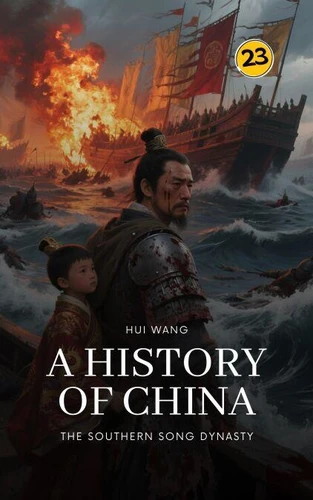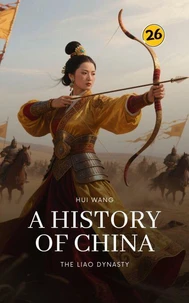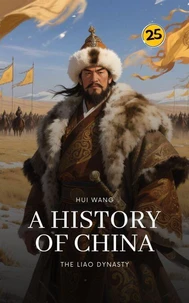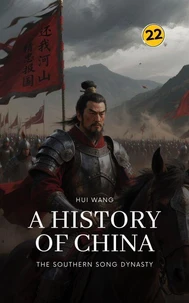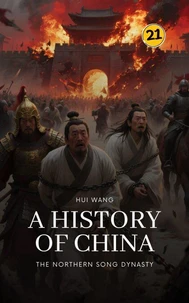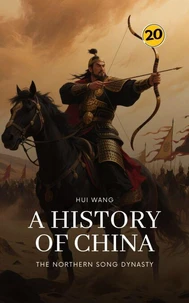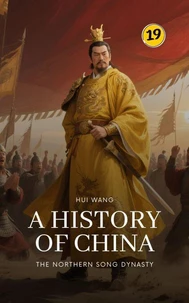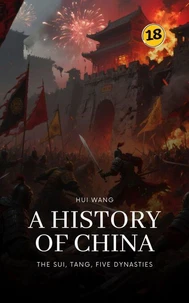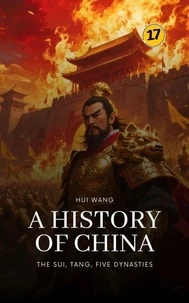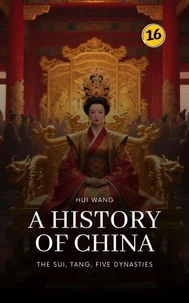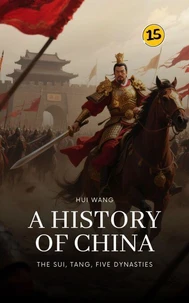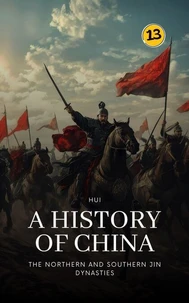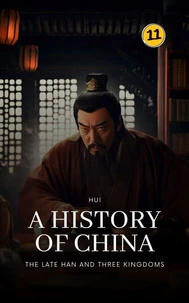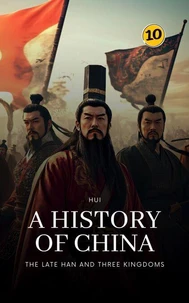Nouveauté
The Southern Song Dynasty: A History of China. A History of China, #23
Par :Formats :
Disponible dans votre compte client Decitre ou Furet du Nord dès validation de votre commande. Le format ePub est :
- Compatible avec une lecture sur My Vivlio (smartphone, tablette, ordinateur)
- Compatible avec une lecture sur liseuses Vivlio
- Pour les liseuses autres que Vivlio, vous devez utiliser le logiciel Adobe Digital Edition. Non compatible avec la lecture sur les liseuses Kindle, Remarkable et Sony
 , qui est-ce ?
, qui est-ce ?Notre partenaire de plateforme de lecture numérique où vous retrouverez l'ensemble de vos ebooks gratuitement
Pour en savoir plus sur nos ebooks, consultez notre aide en ligne ici
- FormatePub
- ISBN978-91-89998-68-1
- EAN9789189998681
- Date de parution03/08/2025
- Protection num.pas de protection
- Infos supplémentairesepub
- ÉditeurHui Wang
Résumé
The Southern Song Dynasty: A History of China, PART TWO, takes you right into the thick of a crumbling empire-where backroom deals, revenge plots, and impossible choices shape the fate of millions. It kicks off with chaos: storm clouds gathering in the government, ministers at each other's throats, and a rebellion sparked by Wu Xi that sends shockwaves through Sichuan. What follows is a tug-of-war for power.
Shi Miyuan rises through cunning more than honor, and a court once guided by scholars ends up ruled by schemers. You'll see how dirty politics really got. While officials scrambled for titles, a much bigger threat was closing in from the north. The Mongols weren't just knocking-they were breaking the door down. Möngke Khan marched south with fire and fury, but ran into something he didn't expect: the fortress of Diaoyu.
There, on a rainy cliffside, heaven seemed to intervene-"the place where God broke His whip, " the locals called it. That one moment didn't stop the Mongols, but it sure made them bleed. From Luoyang to Xiangyang, this was a war that pulled no punches. As the dynasty fought to stay alive, a few refused to bend. Yu Jie stood tall in the mountains of Shu. General Liu and his troops clung to hope in the face of certain defeat.
And when the Southern Song took the gamble of marching into Luoyang during the Duanping years, they came heartbreakingly close to turning the tide. But one by one, the cities fell. The court kept moving south, dragging what was left of its dignity along with it. Meanwhile, loyalists like Wen Tianxiang were already preparing for the end-and choosing not to run. Then came the final collapse. The fall of Xiangyang.
The desperate last stand along the Yangtze. The imperial family surrendering at sea. The Battle of Yashan wasn't just the end of a war-it was the moment a whole civilization went under. Some say it ended with silence. Others say it ended with a child emperor in the waves, and a cry no one could forget. In the ashes, a few voices still rang out-like Wen Tianxiang's, who wrote poems in prison while waiting to die for a country that had already died without him.
This isn't just another history of emperors and dates. It's a raw, close-up look at how things fall apart-and what kind of people hold the line when they do. If you're looking for a story full of heart, betrayal, courage, and the kind of loyalty that outlives kingdoms, this is the one.
Shi Miyuan rises through cunning more than honor, and a court once guided by scholars ends up ruled by schemers. You'll see how dirty politics really got. While officials scrambled for titles, a much bigger threat was closing in from the north. The Mongols weren't just knocking-they were breaking the door down. Möngke Khan marched south with fire and fury, but ran into something he didn't expect: the fortress of Diaoyu.
There, on a rainy cliffside, heaven seemed to intervene-"the place where God broke His whip, " the locals called it. That one moment didn't stop the Mongols, but it sure made them bleed. From Luoyang to Xiangyang, this was a war that pulled no punches. As the dynasty fought to stay alive, a few refused to bend. Yu Jie stood tall in the mountains of Shu. General Liu and his troops clung to hope in the face of certain defeat.
And when the Southern Song took the gamble of marching into Luoyang during the Duanping years, they came heartbreakingly close to turning the tide. But one by one, the cities fell. The court kept moving south, dragging what was left of its dignity along with it. Meanwhile, loyalists like Wen Tianxiang were already preparing for the end-and choosing not to run. Then came the final collapse. The fall of Xiangyang.
The desperate last stand along the Yangtze. The imperial family surrendering at sea. The Battle of Yashan wasn't just the end of a war-it was the moment a whole civilization went under. Some say it ended with silence. Others say it ended with a child emperor in the waves, and a cry no one could forget. In the ashes, a few voices still rang out-like Wen Tianxiang's, who wrote poems in prison while waiting to die for a country that had already died without him.
This isn't just another history of emperors and dates. It's a raw, close-up look at how things fall apart-and what kind of people hold the line when they do. If you're looking for a story full of heart, betrayal, courage, and the kind of loyalty that outlives kingdoms, this is the one.
The Southern Song Dynasty: A History of China, PART TWO, takes you right into the thick of a crumbling empire-where backroom deals, revenge plots, and impossible choices shape the fate of millions. It kicks off with chaos: storm clouds gathering in the government, ministers at each other's throats, and a rebellion sparked by Wu Xi that sends shockwaves through Sichuan. What follows is a tug-of-war for power.
Shi Miyuan rises through cunning more than honor, and a court once guided by scholars ends up ruled by schemers. You'll see how dirty politics really got. While officials scrambled for titles, a much bigger threat was closing in from the north. The Mongols weren't just knocking-they were breaking the door down. Möngke Khan marched south with fire and fury, but ran into something he didn't expect: the fortress of Diaoyu.
There, on a rainy cliffside, heaven seemed to intervene-"the place where God broke His whip, " the locals called it. That one moment didn't stop the Mongols, but it sure made them bleed. From Luoyang to Xiangyang, this was a war that pulled no punches. As the dynasty fought to stay alive, a few refused to bend. Yu Jie stood tall in the mountains of Shu. General Liu and his troops clung to hope in the face of certain defeat.
And when the Southern Song took the gamble of marching into Luoyang during the Duanping years, they came heartbreakingly close to turning the tide. But one by one, the cities fell. The court kept moving south, dragging what was left of its dignity along with it. Meanwhile, loyalists like Wen Tianxiang were already preparing for the end-and choosing not to run. Then came the final collapse. The fall of Xiangyang.
The desperate last stand along the Yangtze. The imperial family surrendering at sea. The Battle of Yashan wasn't just the end of a war-it was the moment a whole civilization went under. Some say it ended with silence. Others say it ended with a child emperor in the waves, and a cry no one could forget. In the ashes, a few voices still rang out-like Wen Tianxiang's, who wrote poems in prison while waiting to die for a country that had already died without him.
This isn't just another history of emperors and dates. It's a raw, close-up look at how things fall apart-and what kind of people hold the line when they do. If you're looking for a story full of heart, betrayal, courage, and the kind of loyalty that outlives kingdoms, this is the one.
Shi Miyuan rises through cunning more than honor, and a court once guided by scholars ends up ruled by schemers. You'll see how dirty politics really got. While officials scrambled for titles, a much bigger threat was closing in from the north. The Mongols weren't just knocking-they were breaking the door down. Möngke Khan marched south with fire and fury, but ran into something he didn't expect: the fortress of Diaoyu.
There, on a rainy cliffside, heaven seemed to intervene-"the place where God broke His whip, " the locals called it. That one moment didn't stop the Mongols, but it sure made them bleed. From Luoyang to Xiangyang, this was a war that pulled no punches. As the dynasty fought to stay alive, a few refused to bend. Yu Jie stood tall in the mountains of Shu. General Liu and his troops clung to hope in the face of certain defeat.
And when the Southern Song took the gamble of marching into Luoyang during the Duanping years, they came heartbreakingly close to turning the tide. But one by one, the cities fell. The court kept moving south, dragging what was left of its dignity along with it. Meanwhile, loyalists like Wen Tianxiang were already preparing for the end-and choosing not to run. Then came the final collapse. The fall of Xiangyang.
The desperate last stand along the Yangtze. The imperial family surrendering at sea. The Battle of Yashan wasn't just the end of a war-it was the moment a whole civilization went under. Some say it ended with silence. Others say it ended with a child emperor in the waves, and a cry no one could forget. In the ashes, a few voices still rang out-like Wen Tianxiang's, who wrote poems in prison while waiting to die for a country that had already died without him.
This isn't just another history of emperors and dates. It's a raw, close-up look at how things fall apart-and what kind of people hold the line when they do. If you're looking for a story full of heart, betrayal, courage, and the kind of loyalty that outlives kingdoms, this is the one.

